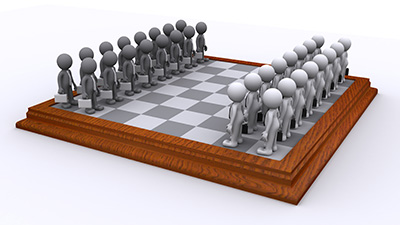By Cammie Scott
Professionals often hear things such as:
- Your strategy needs to be aligned with the strategy of the organization.
- What is your strategy for this situation?
- You need to be more strategic in your thinking.
- It’s all about strategy.
But what is strategy? What does that mean and how can you use it to your advantage?
What is it?
Strategy is a military term. It comes from the Greek word “stratiyeia” which is a combination of “stratos” or army and “ago” which means guiding, moving and leading armies. It is the art of troop leader; office of general, command, or generalship. The word referred to the stratagem, plan or scheme intended to outwit an opponent or achieve a purpose. Ancient generals used it to deploy their troops and defeat the enemy.
In the 18th century, it was translated into the Western language meaning a comprehensive way to try to pursue political ends, including the threat or actual use of force in a military interaction in which adversaries meet.
In today’s world, a strategy defines goals and how they are achieved within the limits of one’s resources. It is a high level plan to achieve one or more goals when conditions are uncertain.
The Business Dictionary defines strategy this way:
- A method or plan chosen to bring about a desired future, such as achievement of a goal or solution to a problem
- The art and science of planning and marshalling resources for their most efficient and effective use. The term is derived from the Greek work for generalship or leading an army. http://www.businessdictionary.com/definition/strategy.html
It is a scheme or plan comprised of activities that are designed to deliver a unique mix of value. It is choosing to perform activities that will give you a competitive advantage, such as: doing activities differently, or performing activities that rivals are not doing, or in a way they are not doing them.
Why is it Important?
Although most people are not generals and most businesses are not involved in an active combat situation, we all want to have more, be more, and do more. Individuals and businesses alike face the challenge of limited resources. This is where strategy comes into play. Strategy involves setting goals, determining actions to achieve the goals, and mobilizing resources to execute the actions. A strategy defines how you will achieve your goals with the resources you have available.
Strategy provides a framework for making decisions about how you will play the game of business and life. Daily you face decisions about capital investments, operational priorities, marketing efforts, hiring, firing, branding, and sales all while managing your own life goals, priorities, and to do list. The strategy guides your decision making process to ensure you don’t go in too many different directions, accomplish little, squander resources and profits, or suffer confusion and discontentment in your personal life.
Strategy versus Planning
Although the words strategy and planning are often used interchangeably or together, they are not the same. There is a difference in a plan and a strategy.
Planning
A plan lays out the actions needed to accomplish a task or goal. It is an arrangement, a pattern, a program or a scheme for a definite purpose. It is very concrete in nature and doesn’t allow for deviations. If Plan A doesn’t work, then you go to Plan B which is different from Plan A.
Plans are useful tools to keep you organized and on track. A plan provides a clear framework from which to build a sure direction to follow, with intermittent milestones to pass in order to reach an end goal. It gives confidence and stability. It increases transparency of work, leaves no room for assumptions and brings clarity to the actions that need to be done to accomplish the goal.
Types of plans include:
- Contingency – What is our backup plan?
- Succession – Who will take over if a key person dies, becomes disabled, or retires?
- Operational – What is our process for this?
- Sales – What will we sell, who will we sell it to and how will we sell it?
- Financial – How much do we want in profits and how will we get it?
Strategy
A strategy is an idea used to accomplish a goal. It is very flexible and open for adaptation and change.
Strategy involves creativity, collaboration and innovation. It encourages openness and debate from every side. It embraces questions and out of the box ideas. It allows for a natural flow of thought and continual momentum that builds success principles. It can surprise, impress, progress and put you the track to becoming not only a competitor, but a winner in your industry.
Strategy doesn’t answer all the questions needed for implementation. That’s planning. Strategy sets the direction. Planning plots the course.
Where Do You Get Strategy?
Strategy is about shaping the future. It can be planned or it can organically emerge from activity patterns as the organization competes and adapts to a changing set of circumstances. Dr. Vladimir Kyint defines strategy as “a system of finding, formulating, and developing a doctrine that will ensure long-term success if followed faithfully.”
Today’s military relies heavily on complexity theory and game theory when they are developing their strategies. Complexity theory looks at the world as a complex system in which many components are interconnected and impact one another. For example, the collapse of the subprime mortgage market triggered the financial crisis of 2008 that led to collapse of Lehman Brothers and an international banking crisis. It was the snowflake that triggered the avalanche.
Game theory, in a technical sense, uses math to look at strategic interactions between rational decision makers. It is a method of strategic thinking where decisions are made by looking from different perspectives and anticipating possible actions and reactions. The primary use of game theory is to describe and model how human populations will behave. For example, “What will the public perception be if we decide to outsource the work of a large group of employees and terminate their employment?”
It Starts with Really Good Questions
You don’t need to be a statistician or an expert in string theory to be good at strategy, however you do need to be really good at asking questions. This often means you have to step out of your individual role in an organization and think about the organization as a whole.
- What value do we create?
- What sets us apart?
- What are customers willing to pay for?
- What is your business model?
- How will we turn an idea into revenues?
- What core capabilities are needed?
- What is the timeline of the product launch?
These are only a few of the questions you will need to answer when developing a winning strategy. Think about what the organization will do to deliver value to customers, generate revenues, and increase profits. Strategy establishes the game you are playing and how you expect to win. It also defines what you don’t do and why you don’t do it. Strategy helps you identify products, services, and target markets. It helps you establish the business model used to profitably create value.
Consider what core capabilities you will need to have to meet your business objectives. In other, words what resources (sales people, technical, buildings, supplies, expertise, etc.) do you need to accomplish the stated mission?
It Ends with a Plan
Strategy and planning are two separate and distinct functions. Strategy is only part of the equation, it points the business in the right direction by clarifying what you want to do or accomplish. Planning is the second part. A plan says how and what you will do. Strategy combined with a plan gives the stakeholders focus. Focus leads to action and action leads to results.
Those who think govern those who labor.
Schedule some time to strategize. Think about what you want to accomplish in your personal life, your professional life, and in your organization. The ability to think clearly and strategize will set you apart from your peers, give you greater success in life, and advance your career to new levels.

CK Harp & Associates cscott@ckharp.com www.ckharp.com
